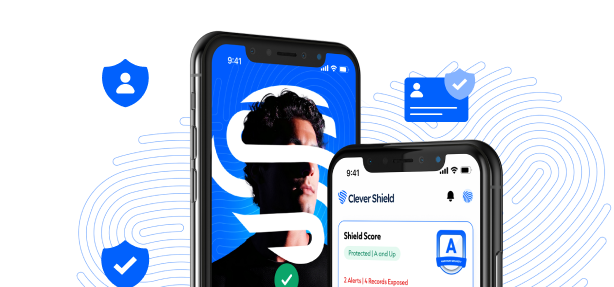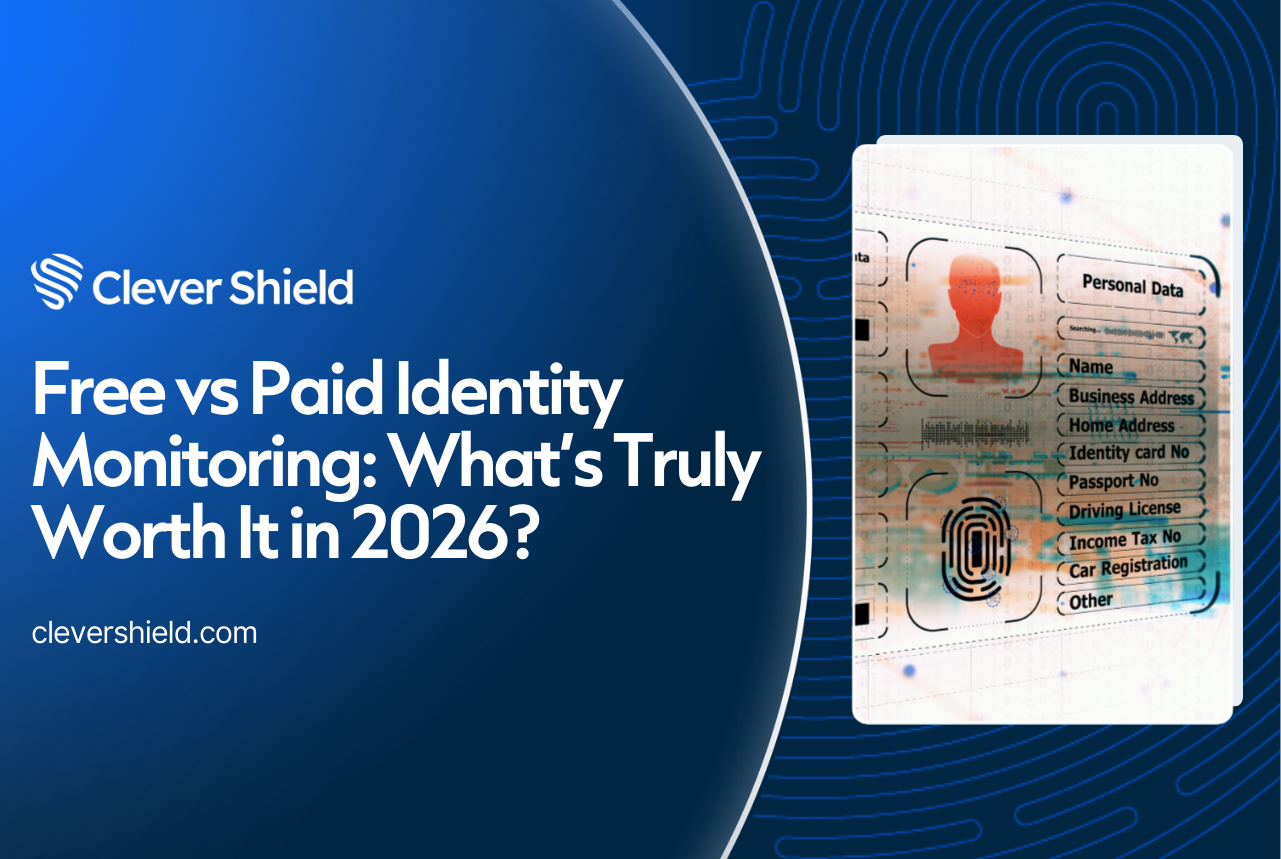The Real Price of Identity Theft
When most people think about identity theft, they imagine a criminal draining a bank account or making a few unauthorized purchases. But the truth is, identity theft carries a much higher price — one that extends far beyond immediate financial loss. Victims spend months or even years repairing the damage. They lose money, time, focus, and peace of mind. Families feel the strain, careers can be disrupted, and every notification, email or bill feels suspicious.
The Federal Trade Commission (FTC) has reported that victims not only lose billions each year but also face hidden financial and emotional costs.
This article reveals the real financial, emotional and personal costs of identity theft and shows how CleverShield helps you avoid paying that price alone. You’ll learn where the most painful costs hide, how to quantify the impact and which steps really reduce risk. Also see how professional restoration, insurance coverage and continuous monitoring work together to protect your future. We’re not just informing you — we’re equipping you to act.
The Financial Toll Most People Don’t Expect
Direct Losses and Fraudulent Charges
The most visible losses happen when criminals make purchases or move money, and credit card fraud is often reimbursed but the ecosystem of fraud is bigger than card charges. Victims face:
- Fraudulent loans opened in their names. These can be personal loans, auto loans or even mortgages. By the time a collection notice arrives interest and fees have already accrued.
- Medical bills for services never received. Medical identity theft can create thousands of dollars in surprise bills and contaminate your medical history.
- Utility and phone accounts opened with stolen credentials. Unpaid balances end up in collections and damage your credit.
- Tax refund theft. A fraudster can file a return first and capture your refund forcing you into a long dispute process — a situation outlined by the IRS.
Even when some funds are reimbursed, out-of-pocket expenses add up. Victims pay for notarizations, certified mail, credit reports, document replacements and sometimes legal consultations just to prove who they are.
Credit Damage and Loan Denials
The cost of a damaged credit profile rarely shows up on a single bill but compounds for years. When fraudulent accounts are reported late or sent to collections credit scores drop. The ripple effects include:
- Higher borrowing costs. A lower score raises interest rates on car loans, credit cards and mortgages — sometimes adding tens of thousands of dollars over the life of a loan.
- Security deposits and insurance premiums. Landlords, utilities and insurers use credit-based pricing. A dinged score means bigger deposits and higher premiums.
- Lost access and lost timing. You may be denied a rental during a competitive market or miss a low-rate window because you’re stuck proving a debt is fake.
Victims are encouraged to monitor their reports at AnnualCreditReport.com to catch fraudulent activity early.
Long-Term Financial Consequences
Fraud’s hidden costs live in the future:
- Opportunity loss. Money set aside for retirement or education is diverted to handle emergencies, legal help or higher rates, shrinking long-term compounding.
- Budget drag. Time spent managing fraud is time not spent optimizing bills, investing or earning. Small delays add up and reduce financial momentum.
- Identity whack-a-mole. Once your data circulates, additional attempts can recur for years, creating recurring micro-costs in time and attention. The Privacy Rights Clearinghouse has documented how breaches keep data in circulation long after the initial theft.
The headline lesson: identity theft is not a one-time event. It’s a cascade that can distort your financial trajectory if you face it alone. CleverShield’s insurance and restoration support are designed to interrupt that cascade early.
The Emotional and Psychological Impact
Anxiety, Stress and Loss of Peace of Mind
Identity theft feels like an invisible burglary. You can’t see the damage but it touches everything — your inbox, your bank app and your daily routine. Typical emotional costs include:
- Hypervigilance. Constantly checking statements and notifications.
- Sleep disruption. Worrying about the next surprise bill or denial.
- Digital avoidance. Fear of using online banking, auto-pay or shopping — which creates its own convenience and late-fee costs.
The CDC highlights how chronic stress can compound into anxiety and insomnia, common in identity theft victims.
The Family Burden
Identity theft can quickly become a household problem. Spouses rework budgets, adult children help their parents navigate phone scams, and parents managing a child’s synthetic identity case face piles of paperwork. The unseen cost is time together replaced by case management. The FBI’s Elder Fraud Program notes how families often need to intervene for senior relatives. CleverShield lightens that load with experts who take the lead and keep the family informed.
The Cost of Time and Energy
Hours Spent on Phone Calls and Paperwork
The average victim spends over 200 hours unraveling fraud: calling banks, waiting on hold, requesting police reports, sending notarized letters and documenting every step for credit bureaus. Those hours stretch across months, eroding momentum and morale. The government’s IdentityTheft.gov provides a checklist of these steps — but CleverShield handles them for you.
Lost Productivity and Wages
Time away from work has a direct cost. Missed shifts, lost freelance hours, postponed projects and the mental overhead of switching between “fraud mode” and “work mode” all subtract from earnings and performance. CleverShield’s restoration specialists handle creditor calls and bureau disputes for you, giving you those hours back.
The Hidden Costs in Everyday Scenarios
Identity theft doesn’t just appear as stolen money. Its impact spreads across different areas of daily life. Consider these common scenarios:
- Career disruption. Fraudulent records can interfere with job applications or background checks, delaying professional opportunities.
- Unexpected legal costs. Victims may need attorneys to remove fraudulent liens, tax issues or debts — an expense that can run into thousands of dollars.
- Blocked education or housing opportunities. Students may be denied loans and renters may face lease rejections when false accounts appear on their credit.
Each of these examples highlights a critical point: the true cost of identity theft is not just measured in dollars stolen — it’s also lost opportunities, added stress and time you’ll never get back.
How CleverShield Covers the Hidden Costs
Licensed Restoration Experts
CleverShield assigns licensed restoration specialists who manage the heavy lifting end-to-end. They:
- Contact creditors, banks and collectors.
- File disputes with credit bureaus and follow through until items are removed.
- Coordinate police reports and affidavits where needed.
- Keep a documented paper trail so corrected records stay corrected.
This is the difference between spending hundreds of hours yourself and delegating to professionals who do this every day.
$1 Million Insurance Protection
CleverShield includes up to $1 million in identity theft insurance to reimburse eligible out-of-pocket expenses such as:
- Lost wages from time spent resolving fraud.
- Legal fees required to clear records or liens.
- Costs for document replacement, notarization and certified mail.
Insurance does not undo the frustration but it ensures you are not left paying to fix a crime you did not commit.
24/7 Monitoring and Alerts
The best way to reduce hidden costs is to detect problems early. CleverShield’s continuous monitoring and real-time alerts help you:
- Catch fraudulent account openings before they age into collections.
- Identify data exposures on the dark web and rotate credentials.
- Respond quickly so the problem stays small and less expensive.
Prevention plus rapid response is the formula that protects both your finances and your peace of mind.
FAQs
Q1: Will banks always reimburse my losses?
No. Card charges are often reversed but loans, medical bills and tax filings can require lengthy disputes and legal support that banks do not cover. CleverShield’s restoration and insurance fill that gap.
Q2: How long does recovery take without help?
Many victims spend 6 months or more handling disputes, letters and follow-ups. With CleverShield, licensed specialists manage the process, reducing the time and effort you spend personally.
Q3: Can identity theft hurt my credit for years?
Yes. Collections, charge-offs and hard inquiries can linger and raise borrowing costs. The sooner fraudulent items are disputed and removed the faster your score recovers.
Q4: Does identity theft really affect mental health?
Yes. The uncertainty and vigilance required to monitor every account can fuel anxiety and insomnia. Offloading restoration to experts reduces that mental load.
Q5: Can CleverShield protect my whole family?
Yes. Family plans extend monitoring and restoration to spouses/partners and children — the groups most often overlooked until problems surface.
Q6: What makes CleverShield different from credit monitoring alone?
Credit monitoring alerts you to problems. CleverShield pairs alerts with licensed restoration and insurance so you also have the resources to fix the problem completely.
Conclusion: Don’t Pay the Price Alone
The hidden costs of identity theft go far beyond the initial fraud. They touch your credit, career, schedule and peace of mind. But you don’t have to pay those costs by yourself.
With CleverShield you get continuous monitoring, instant alerts, up to $1 million in insurance coverage and a dedicated team of licensed restoration specialists who handle the heavy lifting for you — from the first dispute to the final confirmation that your name is clear.
Protect your time, your credit. and your peace of mind. Start your protection with CleverShield today.







